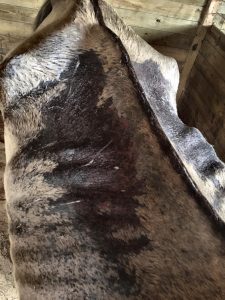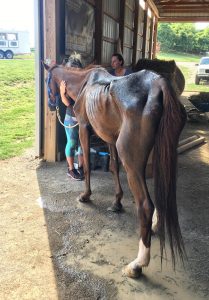As I sit on this side of my computer screen watching the drama unfold with the five horses from Jackson County who were obviously neglected these natural questions occur:
How?
Who?
Why?
How does this happen? Who would do this? Why?
I don’t know the details of this specific case and I’m not attempting to answer all the possibilities, but I would like to highlight a few.
Ignorance.
What a tricky thing. If you don’t know…what you don’t know…then how can you solve the problem. The first time I saw this truly displayed was in a local horse neglect case. It was easy to see the horses in a local pasture losing weight as the winter progressed. Yes, food was provided…but not enough as was evident by the constant decline in the horses weight. Amazingly, one visit from the local humane agent corrected the problem. Once. One talk. You don’t know what you don’t know…until someone educates you.
Ironically the lady who lead the ‘intervention’ or education admitted that just a few years earlier she would not have been able to correctly identify a low body scoring horse. She was an avid animal lover but had all small animals. She took the position in a county when no one else stepped up. Her heart was in the right place but as she stated, ‘I thought horses were supposed to look like cows. It wasn’t until I had been doing the job for month and I saw a horse being ridden down the road that I realized I had been looking at it all wrong.’
Education, education, education.
Finances.
This one pulls on the heart. When money runs low everyone tends to suffer some and eventually decisions must be made. Tough love says if you can’t care for them then you need to find a better way…but that isn’t always as easy to do as it is to say.
Impaired judgement.
Think drug abuse or any other disease, lifestyle, or chemical imbalance that could lead to impaired judgement. I love that in Bella Run Equines post about the horses Rachel pointed out that one horse had braids in the mane. Braids indicate care. Braids indicate good intentions. Could they indicate even more?
Now onto how we can prevent this.
I believe the answer to the the question, “How can we prevent horse neglect”, can be found hidden inside of our response. How did we respond?
One person noticed a problem and brought it to the attention of the community…and the community responded. In this case Facebook was the main medium of community…but community is the key.
The community has pulled together and reacted to what has happened. People have posted, shared and commented. People have donated, driven and prayed.
Now what if we turned this reaction into a response. An effort to educate. To embrace. To empower.
If people don’t know…who’s going to tell them?
If people run out of money…who’s going to help them?
If people have impaired judgement…who’s going to step in.
We have done a good job as a community…once it made it onto our computer screens. Could intervention have happened sooner? Theses horses didn’t end up looking like this in one day, one weekend or one month.
I’m sure many of you can add to this short list of things to consider and please do.
P.S.- The rescued horses are at Bella Run Equine. Visit their website or their FB page for the most up to date info.
4 Comments
Leave a Comment

FREE PDF DOWNLOAD
WHY IS MY HORSE...?
100% Private - 0% Spam
No one taught you the skills you need to work through these things.
Riders often encounter self-doubt, fear, anxiety, frustration, and other challenging emotions at the barn. The emotions coursing through your body can add clarity, or can make your cues indistinguishable for your horse.
Learning these skills and begin communicating clearly with your horse.
Click here to learn more.



Education is one avenue, however it will not change the “hoarding” that contributes to abuse and neglect. Hoarding is a mental illness and it seems the animal hoarders have more rights than the animals.
The other issue I see is when people are too stubborn to admit that they can’t properly care for the animals and it isn’t noticeable to others until the body score is very low. They are over their heads, but refuse to allow help!
Then a few weeks ago, I signed a petition for humane treatment of race horses. The photos of the horse’s decaying flesh in the perfect shape of a saddle and the maggots occupying space that should never, ever be exposed. Only to learn the horse had been recently used in a race which is so inhumane and it all comes down to GREED!
Too many innocent animals suffer needlessly. Educate horse owners, law makers, law enforcement and the sports and entertainment industry on humane standards.
Stacy,
This is very well written. It pulls on my heart strings to see this and try with all my might to understand the how and why. But you hit the nail on the head. I sit here wondering if my horse is to “fat” because the vet thinks so and the farrier thinks it too. But today the Chiropractor said she looks just fine, so as I keep reading this terrible story,I thank God that I can at least provide my horse with plenty of love and food.
Yes, that is reason for gratitude. I have it also. My dilemma now is that I have a small donkey and two not-so-miniature miniature horses, all of whom could be living on air, which is lovely, except that I also have a 19-year old TB who, for the first time since I got him at age 3, is showing shadows of ribs. I had to switch from the high quality second cutting hay he has been getting all of his life in order the save the lives of the other three. I only have a small property, and they always end up together, no matter how hard I try to separate them. They are so bonded! I worry that the horse will lose weight and be unable to gain it back at his age. I don’t really ride any more (too old, work all the time, slightly crippled with arthritis) and I hate to see him losing his muscles and showing ribs. He still looks good for his age, so maybe I worry too much.
Great point.. action to educate.. is the key